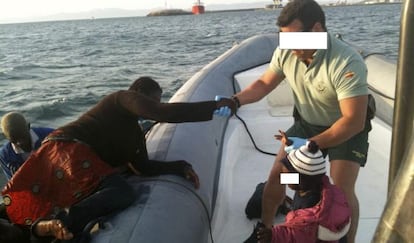Children used by gangs as ‘human passports’ rescued in Melilla
Youngsters were sold to migrants who passed them off as their own to enter Spain

It is one of the many tricks that those trying to enter Spain illegally use: purchase a child and try to pass them off as their own son or daughter to assure safe passage.
In the last two years, 10 of these children have been rescued as part of the Civil Guard's Operation Herodoto. Twelve adults have also been placed under official investigation for declaring themselves to be their biological parents, with the aim of avoiding an expulsion order or obtaining preferential treatment to enter Europe.
Now, with the closure of the operation, the Civil Guard believes the practice has been wiped out.
Operation Herodoto was set up in 2011 when the Civil Guard detected that international gangs were using a new method of illegally getting immigrants into the Spanish north African exclave of Melilla. For a prior payment of 1,500 to 2,000 euros, they would place a child with a woman on one of the flimsy patera boats used by illegal migrants, who would then try to pass them off as their own offspring at Spanish border control.
The traffickers abused the vulnerability of the children, who were normally under 10 years of age, and did not hesitate to put their personal safety at risk. From time to time bodies of drowned youngsters have been recovered from the sea, which no one aboard the boat from which they fell claimed as their own.
To test these suspicions, a protocol was set up that involved Interpol, the public prosecutor for minors, the Melilla temporary immigrant holding center (CETI), the minors and family section of the Melilla social wellbeing and health department, and the University of Granada, which carried out the DNA tests.
The traffickers abused the vulnerability of the children and did not hesitate to put their personal safety at risk
In the last two years DNA checks have been carried out on 12 people of sub-Saharan and Algerian origin and the children with whom they were traveling. In 10 of these cases no biological link was found between the adults and their supposed offspring. "When it was out in the open that the children arriving were subjected to DNA tests, the results did start to correspond between parents and children, which allowed us to confirm that this practice has been canceled by the gangs," says a Civil Guard spokesman.
Little more is known about the real identity of the youngsters. "We are talking about children who come from Third World countries, countries in conflict. It is very difficult to confirm who they are."
The Civil Guard's findings show that the gangs captured the youngsters in African countries and handed them over to adult immigrants who had been netted by the same networks in order to be exploited in Europe.
Investigators have had to confront a wide variety of situations over the past two years. In some cases immigrants threatened to throw a child into the water when their boat was intercepted. There was also the case of a child who left the Melilla CETI with his supposed biological mother, only to return with another identity and a new mother. Another of the rescued children was sold by his real mother for 20,000 dinars and used by several different women on several different occasions.
The rescued children have been placed under the protection of Melilla social services. If they had not been saved, they would likely have faced an uncertain future. "They would have been abandoned or they would have gone on being used to bring in immigrants, or for something worse. The trafficking of human beings has a lot of different faces," the Civil Guard say.
Tu suscripción se está usando en otro dispositivo
¿Quieres añadir otro usuario a tu suscripción?
Si continúas leyendo en este dispositivo, no se podrá leer en el otro.
FlechaTu suscripción se está usando en otro dispositivo y solo puedes acceder a EL PAÍS desde un dispositivo a la vez.
Si quieres compartir tu cuenta, cambia tu suscripción a la modalidad Premium, así podrás añadir otro usuario. Cada uno accederá con su propia cuenta de email, lo que os permitirá personalizar vuestra experiencia en EL PAÍS.
¿Tienes una suscripción de empresa? Accede aquí para contratar más cuentas.
En el caso de no saber quién está usando tu cuenta, te recomendamos cambiar tu contraseña aquí.
Si decides continuar compartiendo tu cuenta, este mensaje se mostrará en tu dispositivo y en el de la otra persona que está usando tu cuenta de forma indefinida, afectando a tu experiencia de lectura. Puedes consultar aquí los términos y condiciones de la suscripción digital.








































